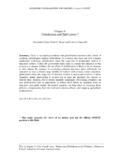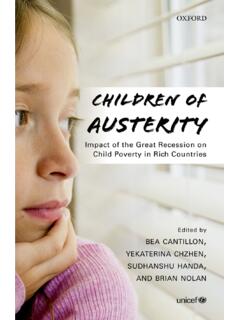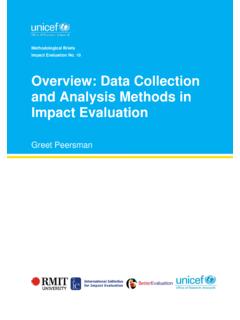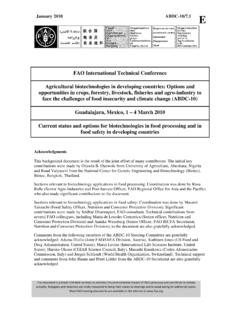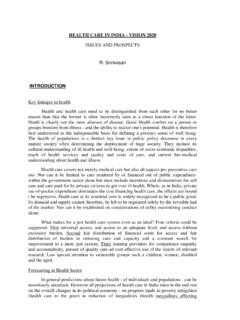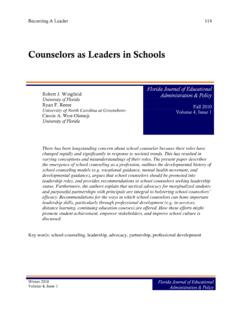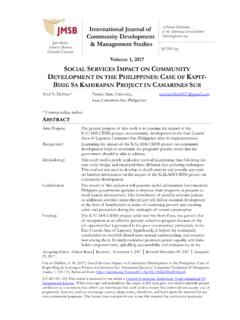Transcription of Children and the Sustainable - unicef-irc.org
1 Building the FutureChildren and the Sustainable Development Goals in Rich CountriesUNICEF Innocenti Report Card 14 Children in the Developed WorldInnocenti Report Card 14 was written by Chris Brazier. The UNICEF Office of Research Innocenti would like to acknowledge the generous support for Report Card 14 provided by the Government of part of this Innocenti Report Card may be freely reproduced using the following reference: UNICEF Office of Research (2017). Building the Future: Children and the Sustainable Development Goals in Rich Countries , Innocenti Report Card 14, UNICEF Office of Research Innocenti, Florence.
2 The Innocenti Report Card series is designed to monitor and compare the performance of economically advanced countries in securing the rights of their 1988 the United Nations Children s Fund (UNICEF) established a research centre to support its advocacy for Children worldwide and to identify and research current and future areas of UNICEF s work. The prime objectives of the Office of Research Innocenti are to improve international understanding of issues relating to Children s rights, to help facilitate full implementation of the Convention on the Rights of the Child, supporting advocacy worldwide.
3 The Office aims to set out a comprehensive framework for research and knowledge within the organization, in support of its global programmes and policies. Through strengthening research partnerships with leading academic institutions and development networks in both the North and the South, the Office seeks to leverage additional resources and influence in support of efforts towards policy reform in favour of produced by the Office are contributions to a global debate on Children and may not necessarily reflect UNICEF policies or approaches. The views expressed are those of the Office of Research Innocenti receives financial support from the Government of Italy, while funding for specific projects is also provided by other governments, international institutions and private sources, including UNICEF National photo Shutterstock United Nations Children s Fund (UNICEF), June 2017 ISBN: 978-88-6522-050-4eISBN: 978-92-1-060790-2 ISSN: 2519-108X UNICEF Office of Research Innocenti Piazza SS.
4 Annunziata, 12 50122 Florence, ItalyTel: +39 055 2033 0 Fax: +39 055 2033 @UNICEFI nnocenti the FutureChildren and the Sustainable Development Goals in Rich Countries Innocenti Report Card 14 Children in the Developed WorldIntroductionReport Card 14 This Report Card offers an assessment of child well-being in the context of Sustainable development across 41 countries of the European Union (EU) and the Organisation for Economic Co-operation and Development (OECD). This group includes both high- and middle- income economies, but here we refer to them all as high- income countries or rich countries , for convenience.
5 The concept of child well-being is rooted in the Convention on the Rights of the Child (CRC) but the Agenda for Sustainable Development adds new dimensions. Progress across all these dimensions will be vital to Children , and advanced economies will therefore need to monitor the situation of Children and young people both nationally and globally. The Sustainable Development Goals (SDGs) agreed by the international community in 2015 represent an ambitious effort to set a global agenda for development that is both equitable and Sustainable , in social, economic and environmental terms.
6 The earlier Millennium Development Goals (MDGs) prioritized the reduction of poverty, as well as progress in related social indicators. The 17 goals of the SDGs add to this a series of outcomes associated with inequality, economic development, the environment and climate change, as well as peace and security. In contrast to the MDGs, which primarily applied to low- and middle- income countries, the ambitious agenda of the SDGs is of necessity universal; it thus applies to rich countries, as well as poor. The stronger focus of the SDGs on equitable development and on leaving no one behind also demands attention to inequalities along multiple dimensions of income and wealth, health and educational opportunity, as well as voice and political participation both within and between countries.
7 Addressing rising inequality and its related problems requires a focus not just on the conditions of the poorest, but also on the consequences of wealth accumulation by the richest. As countries seek to meet the SDGs, so the changing political landscape will require new approaches to ensure inclusive and Sustainable outcomes. Long-term, inclusive and Sustainable social goals are best met through attention to the needs of Children . Ensuring the well-being and realizing the rights of all Children (including migrants and refugees) is not only a commitment made by those states that have signed the CRC, but is also an essential condition for achieving long-term development goals.
8 Every high- income country invests in its Children : healthy, educated Children are better able to fulfil their potential and contribute to society. By contrast, problems of child development often carry through into adulthood, with the resulting social costs accruing to the next generation, too. Indeed, achieving the SDGs is about ensuring that future generations have the opportunities enjoyed by the present generation: successful outcomes for today s Children will build the foundations for the well-being of our societies to the SDGs made by governments now need to be The Sustainable Development Goals have set ambitious targets that apply to rich countries as well as poor.
9 The most telling sign of a nation s progress towards meeting those goals will be how well it meets the needs of its BUILDING THE FUTURE4 INNOCENTI REPORT CARD 14translated into programmes and public investments that can deliver on this wide-ranging set of goals and their 169 accompanying targets. While many goals require commitment at the global or multilateral action level if they are to be achieved (particularly those associated with climate change and the global economy), they also demand national action. If countries are to be held to account for their progress towards these goals, appropriate indicators for monitoring that progress are necessary.
10 UNICEF has long been at the forefront of global efforts to monitor life outcomes and social progress for Children , and it now plays a leading role in monitoring child-related SDG indicators (see Box 2: UNICEF s global role in SDG monitoring, page 6).Many of the SDG indicators proposed by the global community are most appropriate for lower- income contexts. Report Card 14 proposes an adapted set of indicators to assess countries performance against the promise of leaving no one behind when national circumstances, ambitions and existing levels of social progress are already well advanced (see Box on the right: How have Report Card 14 indicators been selected ?)





